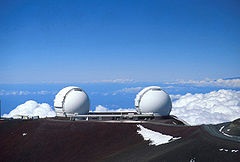|
|
| |
|
|
| |
|
|
|
|
| |
 |
| Mauna Kea in Hawaii
is one of the world's premier observatory sites.
Pictured is the W. M. Keck Observatory, an
optical interferometer. |
Concepts of Astronomy
Astronomy – studies the universe beyond Earth, including
its formation and development, and the evolution,
physics, chemistry, meteorology, and motion of celestial
objects (such as galaxies, planets, etc.) and phenomena
that originate outside the atmosphere of Earth (such as
the cosmic background radiation). Astronomy also
connects with Biology as it has to do with life on
different celestial objects.
What is astronomy?
Astronomy can be described as all the following: |
|
|
|
- An academic discipline: one with
academic departments, curricula and degrees;
national and international societies; and
specialized journals.
- A scientific field (a branch of
science) – widely recognized category of specialized
expertise within science, and typically embodies it
- A natural science – one that
seeks to elucidate the rules that govern the natural
world using empirical and scientific methods.
- A branch or field of space
science
- A hobby or part-time pursuit for
the satisfaction of personal curiosity or
appreciation of beauty, the latter especially
including astrophotography.
|
|
What are astronomical
studies?
Astronomical studies include the following: |
- Fields of astronomy
- History of astronomy
- Basic astronomical phenomena
- Astronomical objects
- Astronomers
|
|
|
|
|
|
|
|
|
|
|
|
|
|
|
|
|
|
|
Search Fun Easy English |
|
|
|
|
|
|
|
|
|
|
|
|
|
|
|
About
Contact
Copyright
Resources
Site Map |